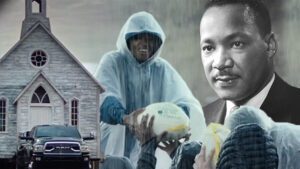by The Cowl Editor on February 15, 2018
Opinion

by Hannah Paxton ’19
Asst. Opinion Editor
“Recognize that he who is greatest among you shall be your servant. That’s a new definition of greatness.” With Martin Luther King Jr. Day and Black History Month at the forefront of everyone’s mind, Dr. King’s words still ring true.
But what does his definition of greatness have to do with buying a Ram truck?
When Dr. King delivered his famous “Drum Major Instinct” sermon in 1968, he inspired everyone to achieve greatness through acts of service. He sought for everyone to have an equal opportunity to serve, regardless of socioeconomic position.
What is so important about this sermon is that he emphasized the importance of greatness being something that one earns through showing compassion to others. He believed that greatness is not something we are simply born with, nor is it something measured by material goods.
Ironically, Fiat Chrysler Automobiles made the decision to use Dr. King’s anti-materialist sermon to sell cars.
The commercial shows various circumstances of human suffering, such as a person doing push-ups, as well as heroic acts, like a firefighter saving a young child. None of these images seem to be related to the one of the Ram truck at the end. Dr. King’s words we are used as a voice-over throughout.
Undoubtedly they meant well, having received permission from Martin Luther King Jr.’s estate. Nevertheless, the Super Bowl commercial struck a nerve for many viewers—and rightfully so.
The aim of the company appeared to be to generate an advertisement that included a positive social idea in order to portray its brand in a good light. What we saw on screen instead was an inappropriate use of Dr. King’s powerful address.
What is most disconcerting is the fact that in the very same “Drum Major Instinct” sermon, Dr. King specifically mentioned automobiles.
He does not praise their utility or the possession of them. Rather, he calls attention to the fact that the wish to be recognized induces people to spend more than they should on material things, like cars.
“Do you ever see people buy cars that they can’t even begin to buy in terms of their income?…it feeds a repressed ego,” said Dr. King in the the same speech that was used in an ad to market a brand of automobiles.
Not only is this choice of speech contradictory in its meaning, but it is also confusing from a marketing perspective.
If the goal was to promote their brand, then where is the correlation between that and advocating a social message? One cannot endorse public service and industrialism at the same time.
In light of a heightened interest in social issues, it is important to recognize that we cannot simply promote equality and diversity for the sake of attaining credibility. Social advocacy is not merely a political or economic concern; it is a fundamental matter that everyone should be invested in.
Regardless of whether or not the Ram advertisement meant well, it did not sit well with the majority of viewers. If we are to endorse social messages, they need to be done sensibly and respectfully, with a primary concern for its value and meaning before its degree of marketability.
If Dr. King were alive today, he would say the same. He would want his words to inspire a movement of love and compassion, not for power or popularity.